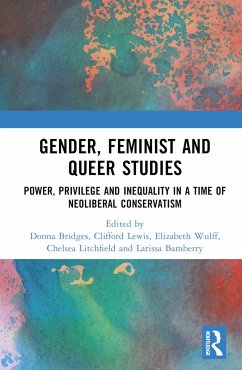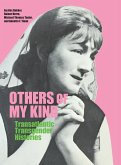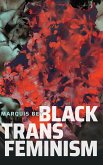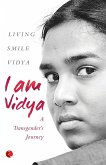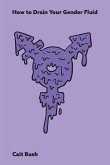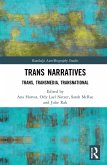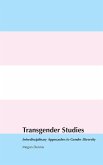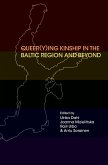Gender, Feminist and Queer Studies
Power, Privilege and Inequality in a Time of Neoliberal Conservatism
Herausgeber: Bridges, Donna; Wulff, Elizabeth; Lewis, Clifford
Gender, Feminist and Queer Studies
Power, Privilege and Inequality in a Time of Neoliberal Conservatism
Herausgeber: Bridges, Donna; Wulff, Elizabeth; Lewis, Clifford
- Gebundenes Buch
- Merkliste
- Auf die Merkliste
- Bewerten Bewerten
- Teilen
- Produkt teilen
- Produkterinnerung
- Produkterinnerung
Exploring scholarship, research, practice and activism on gender, feminist and queer studies, this edited collection examines, analyses and critiques the nature and causes of inequality, disadvantage and marginalisation faced by women, non-hegemonic and LGBTIQA+ identities.
Andere Kunden interessierten sich auch für
![Others of My Kind Others of My Kind]() Alex BakkerOthers of My Kind113,99 €
Alex BakkerOthers of My Kind113,99 €![Black Trans Feminism Black Trans Feminism]() Marquis BeyBlack Trans Feminism106,99 €
Marquis BeyBlack Trans Feminism106,99 €![I AM VIDYA I AM VIDYA]() Living Smile VidyaI AM VIDYA16,99 €
Living Smile VidyaI AM VIDYA16,99 €![How To Drain Your Gender Fluid How To Drain Your Gender Fluid]() Cait BushHow To Drain Your Gender Fluid25,99 €
Cait BushHow To Drain Your Gender Fluid25,99 €![Trans Narratives Trans Narratives]() Trans Narratives180,99 €
Trans Narratives180,99 €![Transgender Studies Transgender Studies]() Megan DennisTransgender Studies82,99 €
Megan DennisTransgender Studies82,99 €![Queer(y)ing Kinship in the Baltic Region and Beyond Queer(y)ing Kinship in the Baltic Region and Beyond]() Queer(y)ing Kinship in the Baltic Region and Beyond45,99 €
Queer(y)ing Kinship in the Baltic Region and Beyond45,99 €-
-
-
Exploring scholarship, research, practice and activism on gender, feminist and queer studies, this edited collection examines, analyses and critiques the nature and causes of inequality, disadvantage and marginalisation faced by women, non-hegemonic and LGBTIQA+ identities.
Hinweis: Dieser Artikel kann nur an eine deutsche Lieferadresse ausgeliefert werden.
Hinweis: Dieser Artikel kann nur an eine deutsche Lieferadresse ausgeliefert werden.
Produktdetails
- Produktdetails
- Verlag: Routledge
- Seitenzahl: 292
- Erscheinungstermin: 13. Juli 2023
- Englisch
- Abmessung: 240mm x 161mm x 20mm
- Gewicht: 605g
- ISBN-13: 9781032328294
- ISBN-10: 1032328290
- Artikelnr.: 67679067
- Herstellerkennzeichnung
- Libri GmbH
- Europaallee 1
- 36244 Bad Hersfeld
- gpsr@libri.de
- Verlag: Routledge
- Seitenzahl: 292
- Erscheinungstermin: 13. Juli 2023
- Englisch
- Abmessung: 240mm x 161mm x 20mm
- Gewicht: 605g
- ISBN-13: 9781032328294
- ISBN-10: 1032328290
- Artikelnr.: 67679067
- Herstellerkennzeichnung
- Libri GmbH
- Europaallee 1
- 36244 Bad Hersfeld
- gpsr@libri.de
Donna Bridges (she/her/hers) is a gender theorist and a feminist researcher who researches gender inequality and gender and work. She has published "Absent aviators: Gender issues in aviation" (Bridges, Neal-Smith & Mills, 2014) and "Creative spaces for qualitative researching: Living research" (Higgs, Titchen, Horsfall & Bridges, 2011). She publishes in international journals such as Gender, Work and Organisation, Journal of Sociology and Feminist Media Studies, and in edited book collections and media commentary. Clifford Lewis (he/him/his) is a marketing academic at Charles Sturt. His research focuses on inclusive marketing and research practice focusing on LGBTQ+ people. Within this domain, he has published a critical review of tourism scholarship on LGBTQ+ people in the Journal of Sustainable Tourism , guidelines for conducting research with LGBTQ+ people in the International Journal of Market Research, and those within contexts where such identities are illegal in the Journal of Hospitality and Tourism Management. Elizabeth Wulff (she/her/hers) is a gender theorist and feminist researcher who specialises in gender theory, cultural studies and English literature. She is a member of the Women in Trades Research Team and CSU's Gender and Feminist Studies (GaFS) Research Network. Elizabeth has published in Extrapolation, Construction Management Economics, Gender, Work and Organization and the Journal of Sociology. She is currently working on projects related to the Women in Trades team. Chelsea Litchfield (she/her/hers) is an associate professor and associate head of school in the School of Allied Health, Exercise and Sport Science at Charles Sturt University. Associate Professor Litchfield's research focuses broadly on gender, sport and media in an Australian context. She is currently working on projects related to women and sport, gender-based abuse and violence in social media spaces and the impact of sport on the mental health of women in regional Australia. Larissa Bamberry (she/her/hers) is an associate professor in employment relations in the School of Business at Charles Sturt University. Her research focuses broadly on the intersection of gender relations in labour markets. She publishes in journals such as Gender, Place and Culture, Gender, Work and Organisation and Construction Management and Economics, and she is currently researching skills and gender in regional labour markets and the workplace wellbeing of frontline workers during and after the COVID-19 pandemic.
Power, privilege and inequality in a time of neoliberal conservatism: an
introduction Part I: Metanarratives and discourse: shaping inequality 1.
Re-envisioning Australian history with once silenced voices and women's
knowledge 2. Post-racial feminism and the reaffirmation of whiteness 3. A
conservative church response to feminism: less power, less privilege and no
equality 4. The silencing of women's voices in contemporary conservative
evangelical churches: "Crying in my wardrobe" Part II: Masculine hegemony
and heteronormativity: constructing society 5. "A boy's own tale": using
intersectional frameworks to chart the reproduction of historical
discrimination in aviation 6. Masculinities, driving and women 7.
Precarious academia: women's employment in Australian universities 8.
Gender, power and work: reporting psychological injuries in the Australian
workplace 9. Masculinity, male caregiving and LGB paramedics: emotional
labour and hegemonic masculinity Part III: Embodiment and representation:
the body as a site of inequality and disadvantage 10. How the gendered body
is constructed in the neoliberal schooling context through discipline and
healthism in contemporary physical education 11. Neoliberalism and gender
inequality in the Marvel Universe 12. Speaking up: a feminist analysis of
the possibility of cultural change in women's artistic gymnastics in
Australia and England 13. Paramedicine and workplace sexual harassment: the
hidden paradox of neoliberalism Part IV: Evaluating change 14. A wolf in
sheep's clothing: a critical view of the post-gay in an Australian context
15. The civility of the privileged: assessing the narrative around
Australia's marriage equality campaign 16. Making the link: secular
democracy, human rights and the cases of marriage equality and abortion
rights 17. Men's behaviour change programmes: addressing power, privilege
and oppression in intimate partner violence 18. Can diversity give
neoliberal technoscience more than it bargained for?: LGBTQ+ researchers
and queering standpoints. Not a conclusion but a way forward: instigating
the road ahead
introduction Part I: Metanarratives and discourse: shaping inequality 1.
Re-envisioning Australian history with once silenced voices and women's
knowledge 2. Post-racial feminism and the reaffirmation of whiteness 3. A
conservative church response to feminism: less power, less privilege and no
equality 4. The silencing of women's voices in contemporary conservative
evangelical churches: "Crying in my wardrobe" Part II: Masculine hegemony
and heteronormativity: constructing society 5. "A boy's own tale": using
intersectional frameworks to chart the reproduction of historical
discrimination in aviation 6. Masculinities, driving and women 7.
Precarious academia: women's employment in Australian universities 8.
Gender, power and work: reporting psychological injuries in the Australian
workplace 9. Masculinity, male caregiving and LGB paramedics: emotional
labour and hegemonic masculinity Part III: Embodiment and representation:
the body as a site of inequality and disadvantage 10. How the gendered body
is constructed in the neoliberal schooling context through discipline and
healthism in contemporary physical education 11. Neoliberalism and gender
inequality in the Marvel Universe 12. Speaking up: a feminist analysis of
the possibility of cultural change in women's artistic gymnastics in
Australia and England 13. Paramedicine and workplace sexual harassment: the
hidden paradox of neoliberalism Part IV: Evaluating change 14. A wolf in
sheep's clothing: a critical view of the post-gay in an Australian context
15. The civility of the privileged: assessing the narrative around
Australia's marriage equality campaign 16. Making the link: secular
democracy, human rights and the cases of marriage equality and abortion
rights 17. Men's behaviour change programmes: addressing power, privilege
and oppression in intimate partner violence 18. Can diversity give
neoliberal technoscience more than it bargained for?: LGBTQ+ researchers
and queering standpoints. Not a conclusion but a way forward: instigating
the road ahead
Power, privilege and inequality in a time of neoliberal conservatism: an
introduction Part I: Metanarratives and discourse: shaping inequality 1.
Re-envisioning Australian history with once silenced voices and women's
knowledge 2. Post-racial feminism and the reaffirmation of whiteness 3. A
conservative church response to feminism: less power, less privilege and no
equality 4. The silencing of women's voices in contemporary conservative
evangelical churches: "Crying in my wardrobe" Part II: Masculine hegemony
and heteronormativity: constructing society 5. "A boy's own tale": using
intersectional frameworks to chart the reproduction of historical
discrimination in aviation 6. Masculinities, driving and women 7.
Precarious academia: women's employment in Australian universities 8.
Gender, power and work: reporting psychological injuries in the Australian
workplace 9. Masculinity, male caregiving and LGB paramedics: emotional
labour and hegemonic masculinity Part III: Embodiment and representation:
the body as a site of inequality and disadvantage 10. How the gendered body
is constructed in the neoliberal schooling context through discipline and
healthism in contemporary physical education 11. Neoliberalism and gender
inequality in the Marvel Universe 12. Speaking up: a feminist analysis of
the possibility of cultural change in women's artistic gymnastics in
Australia and England 13. Paramedicine and workplace sexual harassment: the
hidden paradox of neoliberalism Part IV: Evaluating change 14. A wolf in
sheep's clothing: a critical view of the post-gay in an Australian context
15. The civility of the privileged: assessing the narrative around
Australia's marriage equality campaign 16. Making the link: secular
democracy, human rights and the cases of marriage equality and abortion
rights 17. Men's behaviour change programmes: addressing power, privilege
and oppression in intimate partner violence 18. Can diversity give
neoliberal technoscience more than it bargained for?: LGBTQ+ researchers
and queering standpoints. Not a conclusion but a way forward: instigating
the road ahead
introduction Part I: Metanarratives and discourse: shaping inequality 1.
Re-envisioning Australian history with once silenced voices and women's
knowledge 2. Post-racial feminism and the reaffirmation of whiteness 3. A
conservative church response to feminism: less power, less privilege and no
equality 4. The silencing of women's voices in contemporary conservative
evangelical churches: "Crying in my wardrobe" Part II: Masculine hegemony
and heteronormativity: constructing society 5. "A boy's own tale": using
intersectional frameworks to chart the reproduction of historical
discrimination in aviation 6. Masculinities, driving and women 7.
Precarious academia: women's employment in Australian universities 8.
Gender, power and work: reporting psychological injuries in the Australian
workplace 9. Masculinity, male caregiving and LGB paramedics: emotional
labour and hegemonic masculinity Part III: Embodiment and representation:
the body as a site of inequality and disadvantage 10. How the gendered body
is constructed in the neoliberal schooling context through discipline and
healthism in contemporary physical education 11. Neoliberalism and gender
inequality in the Marvel Universe 12. Speaking up: a feminist analysis of
the possibility of cultural change in women's artistic gymnastics in
Australia and England 13. Paramedicine and workplace sexual harassment: the
hidden paradox of neoliberalism Part IV: Evaluating change 14. A wolf in
sheep's clothing: a critical view of the post-gay in an Australian context
15. The civility of the privileged: assessing the narrative around
Australia's marriage equality campaign 16. Making the link: secular
democracy, human rights and the cases of marriage equality and abortion
rights 17. Men's behaviour change programmes: addressing power, privilege
and oppression in intimate partner violence 18. Can diversity give
neoliberal technoscience more than it bargained for?: LGBTQ+ researchers
and queering standpoints. Not a conclusion but a way forward: instigating
the road ahead

